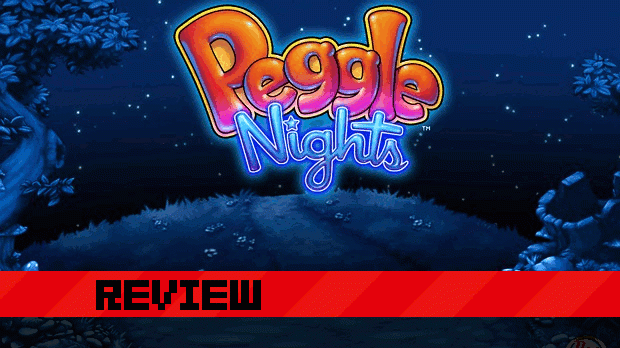So, yeah, I was one of those guys who never played Peggle. Generally, I find casual stuff sickly simple, easily digestible and full of bad design decisions. Just when you’re getting into the groove of a game like Zuma or even Tetris, the game snaps you out of the mood with an insurmountable challenge or dangerously hard level. I don’t like losing — I’m that kind of gamer as well — and I especially don’t like walking away from my digital entertainment with a sour taste in my mouth.
After playing through Peggle Nights, I questioned my outlook on casual games.
I know; that’s not much of a tease. But as I now see it, Peggle is a tried and true series with some deep and addictive mechanics. Peggle Nights is the latest addition in this vein.
Hit the break for the review of the Macintosh version, which debuted a few weeks ago.

Peggle Nights (PC/Mac)
Developer: PopCap Games
Publisher: PopCap Games
Released: September 16, 2008 (PC), February 25, 2009 (Mac)
MSRP: $19.99
Peggle Nights won’t stroke your ego with intricate puzzles or riddles; most of the game’s levels can be conquered in minutes. It won’t astound you with visual acuity or complex music; the presentation is nothing more than a scruffy wool blanket covering the softest of beds. It won’t elicit an emotional reaction or make you care about its characters; the denizens of Peggle Nights are only avatars, created to advance a campaign mode and make sense of special abilities.
But it may redefine your perception of casual games. Or, at least, draw you in kicking and screaming. There’s depth to Peggle Nights, hidden beyond the simplicity, that will mercilessly suck you in, keeping your eyes glued to the monitor.
PopCap Games — the developer of Peggle Nights — is able to do that with two components: a ball and pegs.
The formula of is simple: shoot a metal ball from a centralized cannon in order to clear orange pegs scattered throughout a level. The subtlety present is the understanding of trajectory and ability to predict the way the ball bounces and reacts to the various multi-colored pegs and obstructions in the environment. It isn’t rocket science, and even if you tried to make it such, you would fail. Fortune plays a huge role — often the haphazard, unintelligent shot yields the best results.

Losing is running out of balls, having them fall off-screen. While limited, you can always earn more rotund metal by establishing high scores or by sinking them into a roving container at the bottom of the screen. Winning is negotiating special abilities unlocked by hitting green pegs, twisting the way you approach the next shot — or shots — dramatically.
As I played Peggle Nights, I wondered what I was doing to myself. I was spending countless hours staring at uninspired art, watching a ball bounce between pegs. Why wasn’t I navigating a vast and chaotic multiplayer environment of a current-generation shooter? Why wasn’t I spending my idle time plotting the perfect path in a puzzler like Cuboid? I eventually came to an easy conclusion: a humble depth was drawing me in.
There’s a thin line between winning and losing in Peggle Nights. It’s the difference between getting two free balls from high scores, utilizing powers to their maximum benefit, and allowing Fortune to play her hand as the level opens. Those three factors were sucking me in, sating that desire for complex gameplay — something that a Killzone 2 or Cuboid delivers when you look for it.
Despite the great mechanics, Peggle Nights’s presentation is flat. The Macintosh version’s art is occasionally blurry, especially the foreground objects. I wasn’t able to put my finger on the reason for the manic visuals, but it ultimately doesn’t matter, because as a whole, Peggle Nights has largely unimpressive menus, boring avatars, and a severe lack of detail. The music, the lesser in dull presentation, is slightly better. The simple tunes never drove me nuts, but I can’t say that I enjoyed the basic, funky stuff.

Popping on iTunes — I suggest you give a listen to Podtoid, RetroforceGO!, or The Podcastle — fixes the music issue. The visuals are easy to overlook, considering the pegs and the ball are the real stars of the show. Let me put it this way: there is only a single, truly detracting element in Peggle Nights. There isn’t enough. The campaign, Adventure Mode, is short and sweet — a delicious treat that leaves you hungry for more. You can get seconds in Challenge. It’s a mode that puts gameplay twists on levels in Adventure. It may force you to reach a certain number of points, start with a lesser amount of balls or put you through a gauntlet of levels. Challenge is tough, focused and supported by downloadable content. However, it’s also very short.
A tacked-on Duel mode (play against the AI, or switch off with a friend) punctuated my desire for more. The content will be welcome, but only if it consists of more than 10 levels.
If you’ve played the previous Peggle incarnations by PopCap and enjoyed them, Peggle Nights is a safe purchase. It’s a new coat of paint on a classic casual title. If you’re unfamiliar with the former stuff, do yourself a favor and (at least) download the demo. It won’t disappoint you. Just ask the PC guys, they’ve had it forever.
Score: 8 — Great (8s are impressive efforts with a few noticeable problems holding them back. Won’t astound everyone, but is worth your time and cash.)






Published: Mar 9, 2009 04:00 pm